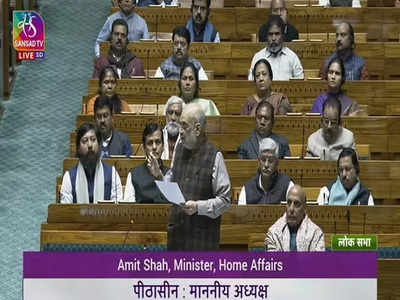
Union home minister Amit Shah on Wednesday took a dig at the Congress over objections of its leaders to some provisions of new criminal law bills, saying "if mind is of Italy, then it is difficult to understand (these provisions)". Replying to the debate on the three criminal law bills in the Lok Sabha, he said these are in accordance with the spirit of the Constitution. He made a veiled attack on Congress over foreign origins of party leader Sonia Gandhi
NEW DELHI: Union Home Minister
Amit Shah
on Wednesday took a dig at the Congress over objections of its leaders to some provisions of new criminal law bills, saying "if mind is of Italy, then it is difficult to understand (these provisions)".
Replying to the debate on the three criminal law bills in the
Lok Sabha
, he said these are in accordance with the spirit of the Constitution.
He made a veiled attack on Congress over foreign origins of party leader Sonia Gandhi
"Those who say we do not understand, I said if you keep your mind open, keep it Indian, you will understand, if you keep that of Italy, you will not understand. It is a question of mind, not of language. If the mind belongs to India, you understand immediately, if not, you will never understand," he said.
Congress members of the standing committee, which examined the three bills, have given dissent notes.
Amit Shah said he is feeling a sense of pride for having the opportunity to change the criminal justice laws after a span of 150 years and pilot the bills in the House.
Bharatiya Nyaya (Second) Sanhita, 2023,
Bharatiya Nagarik
Suraksha (Second) Sanhita, 2023 and the
Bharatiya Sakshya
(Second) Bill, 2023 were later passed by the Lok Sabha.
The minister said that justice forms the bedrock of a civilized society.
"In our Constitution, there are mentions of political justice, economic justice, social justice...It also finds mention in Consitution," he said.
The Home Minister said that for years people had expectations that the criminal justice system should not be based on punishment but justice and the government has done that through the bills.
"The state's first responsibility is to deliver justice. The makers of the Constitution have distributed work between the three pillars of democracy- the judiciary, executive and legislative, to provide justice," Shah said.
"For the first time, these three pillars will bring about not a punishment-centric but a justice-centric criminal justice system. The law will be formed here, the executive will implement it and the judiciary will carry forward the rest of the implementation. These three organs will together and establish a justice system," he said.
Amit Shah said the bills will encourage the use of technology in giving justice to people. He said "mob-lynching" had been included as an offence in the bills. The minister said the British-era laws were aimed at protecting foreign rule and the new bills are people-centric.
Lok Sabha on Tuesday took up discussion on three bills to replace the Indian Penal Code of 1860, Code of Criminal Procedure (CrPC) of 1973 and Indian Evidence Act, of 1872. Amit Shah introduced the three amended criminal law bills in Lok Sabha last week that will replace the IPC, CrPc and Indian Evidence Act.
The Home Minister withdrew the three bills, which were introduced in the Lok Sabha in the monsoon session of parliament. He said that the bills had been withdrawn and three new bills introduced, as a few changes were to be made. He said the bills had been examined by the Standing Committee and instead of coming up with official amendments, it was decided to bring the bills again.
The Bharatiya Nyaya (Second) Sanhita 2023, Bharatiya Nagarik Suraksha (Second) Sanhita 2023, and Bharatiya Sakshya (Second) Bill 2023 will replace the IPC, CrPC and the Evidence Act respectively. The earlier bills were introduced in the lower House of Parliament on August 11 and were referred to the Standing Committee.












 English (US) ·
English (US) ·